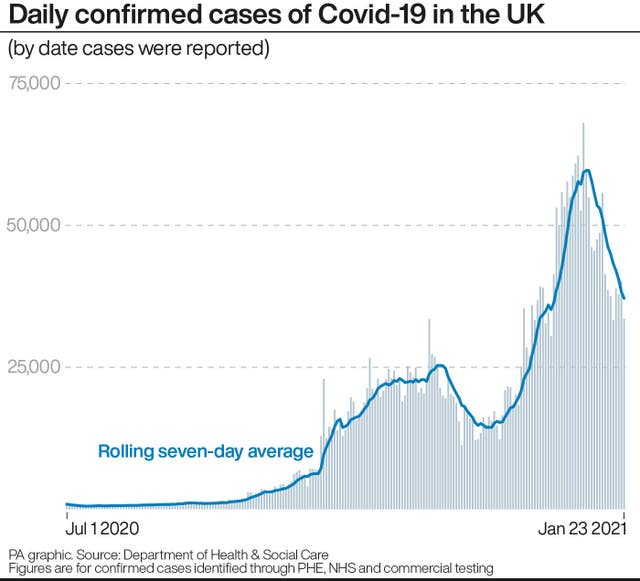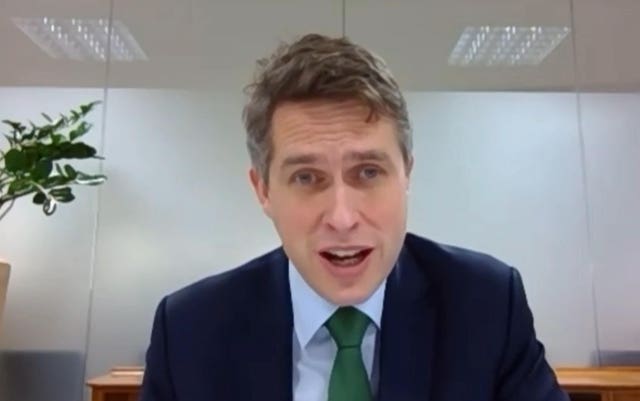The millions of people who have received the coronavirus jab must keep following social-distancing rules if they are not to risk prolonging lockdown restrictions, the deputy chief medical officer for England has warned.
Professor Jonathan Van-Tam said that if those who have been vaccinated begin easing off because they are protected, they are potentially putting at risk those further down the priority list who still need inoculation.
His warning came as the latest Government figures showed the number receiving the first dose of the vaccine across the UK has passed 5.8 million with a record 478,248 getting the jab in a single day.

Writing in The Sunday Telegraph, Prof Van-Tam said it was still not known if people who had been vaccinated could still pass on the virus to others, even though they were protected from falling ill themselves.
“So even after you have had both doses of the vaccine you may still give Covid to someone else and the chains of transmission will then continue,” he wrote.
“If you change your behaviour you could still be spreading the virus, keeping the number of cases high and putting others at risk who also need their vaccine but are further down the queue.
“Regardless of whether someone has had their vaccination or not, it is vital that everyone follows the national restrictions and public health advice, as protection takes up to three weeks to kick in and we don’t yet know the impact of vaccines on transmission.
“The vaccine has brought considerable hope and we are in the final furlong of the pandemic but for now, vaccinated or not, we still have to follow the guidance for a bit longer.”
Prof Van-Tam also hit back at doctors who have criticised the decision to extend the gap between the first and second doses of the vaccine to 12 weeks.
The British Medical Association has written to the chief medical officer for England urging a rethink, saying that in the case of the Pfizer-BioNTech vaccine a maximum gap of six weeks had been mandated by the World Heath Organisation (WHO).
Prof Van-Tam said that extending the gap was the quickest way to get a first dose to as many people as possible as quickly as possible.
He said: “But what none of these (who ask reasonable questions) will tell me is: who on the at-risk list should suffer slower access to their first dose so that someone else who’s already had one dose (and therefore most of the protection) can get a second?”

BMA council chairman Dr Chaand Nagpaul said that while he understood the “rationale” behind the decision, no other country is taking the UK’s approach.
“We think the flexibility that the WHO offers of extending to 42 days is being stretched far too much to go from six weeks right through to 12 weeks,” he said.
“Obviously the protection will not vanish after six weeks but what we do not know is what level of protection will be offered. We should not be extrapolating data where we don’t have it.”

Meanwhile, it is reported that schools in England will not fully reopen next month – and may not return until after the Easter holidays.
The Sunday Times said Education Secretary Gavin Williamson was expected to rule out a return to the classroom after the February half-term break and prepare parents for a prolonged period of home-schooling ahead.
As recently as Thursday, Mr Williamson said that he hoped schools would be able to reopen before Easter, although Downing Street pointedly declined to endorse his comments.
The Government is also considering whether travel restrictions may need to be further tightened amid warnings that new variants of the virus discovered in Brazil and South Africa might be resistant to the vaccines.
Ministers are expected to meet this week to discuss a proposal to require people arriving in the UK to pay to quarantine in a designated hotel to ensure they are following the rules on self-isolating.




Comments: Our rules
We want our comments to be a lively and valuable part of our community - a place where readers can debate and engage with the most important local issues. The ability to comment on our stories is a privilege, not a right, however, and that privilege may be withdrawn if it is abused or misused.
Please report any comments that break our rules.
Read the rules hereLast Updated:
Report this comment Cancel